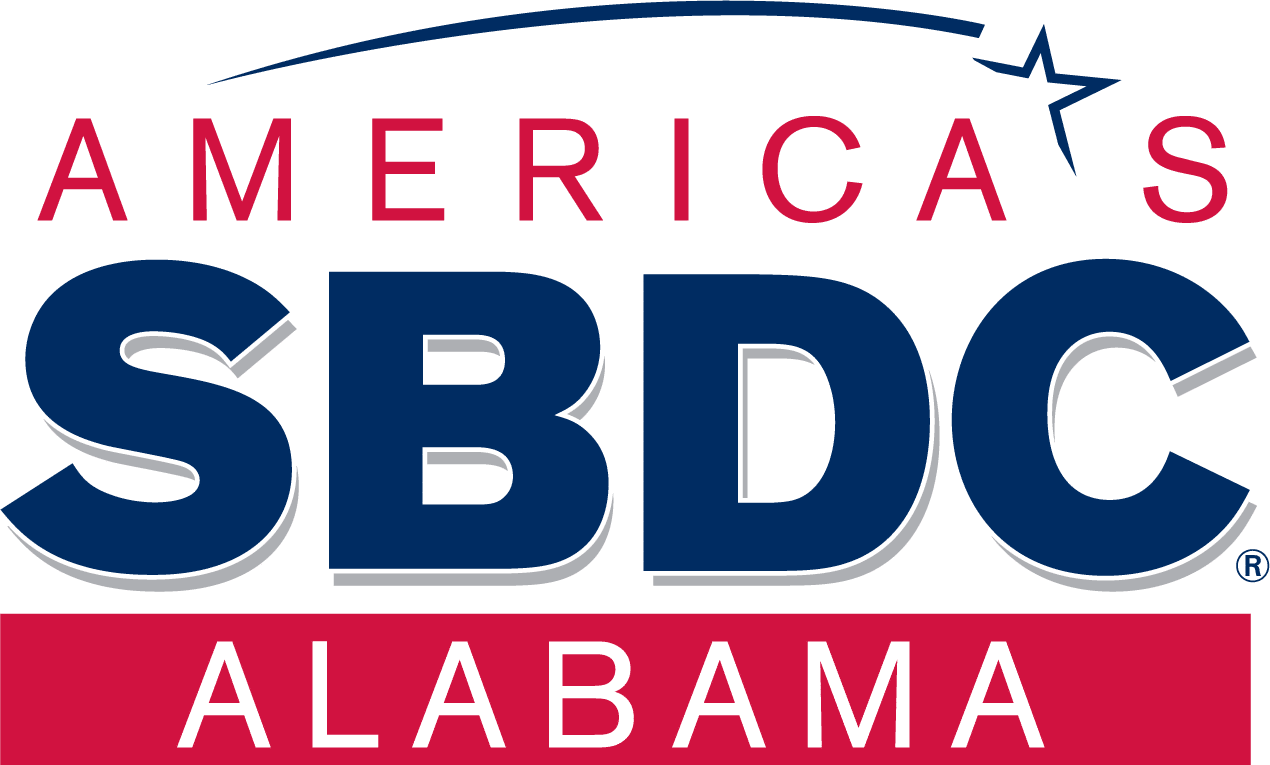Careers
When a full-time employment position with the Alabama SBDC Network at The University of Alabama becomes available, it will be advertised on the UA Jobs Website. Positions at other centers will be filled via their respective host institution (see below). Other SBDC jobs are available on the Association of Small Business Development Center’s website.
The Alabama SBDC also engages part-time, independent contractor positions to assist with special projects based on need and demand for subject matter expertise. Individual candidates that feel they are qualified and would like to contribute to the mission of the Alabama SBDC Network, may review the notices below for specific requests for applications.

Job Openings

The following positions are available at the University of Alabama or at other Alabama SBDC or APEX Accelerator locations.
Please apply directly through the institutions posted below.
UA SBDC Project Consultants (Independent Contractors) – Statewide
Applications for all UA Independent Contractor (Project Consultant) positions should be submitted here: http://bit.ly/SBDC-Contractor
When proposing an hourly rate, please consider that this is public university, and the SBDC is partially funded by scarce federal dollars (SBA).
Are you a good fit?
Successful candidates must enjoy not only working with a wide variety of business types and issues, but derive satisfaction from helping others increase their opportunities for success. With educations and backgrounds in many different fields, our business advisors help owners analyze all aspects of their business to identify areas for management improvement and business growth. Benefit packages vary by university, but most include health, dental, vision, life, disability, and retirement plan options. Several universities offer reduced or free tuition for the employee and their families. We’re looking for candidates that have a passion for helping small businesses succeed – and have the background and skills required to help grow Alabama’s economy, one small business at a time.
Operating Principles
CORE COMPETENCIES
SBDC Business Advisors
The Advisor will be able to:
- Identify and assess the critical business issues facing the existing business client based on inputs such as client interviews, financial statements operating information and external customer/market data.
- Assess the start-up client’s readiness and needs
- Identify and convey to the client the basic steps and considerations for starting or buying a business or franchise and selling, transferring or liquidating a business or franchise.
- Identify available resources and tools including government regulations and services available via multiple sources.
- Assist in developing a strategic plan using tools such as a SWOT analysis, Porter’s 5-Forces or other strategic tools.
- Identify different types of business plans and the purpose and use of each
- Understand the components of a business plan and be able to explain/demonstrate them to a client
- Effectively assist clients to develop a business plan
- Effectively assist clients in implementing their business plan
- Develop an action plan with activities and next steps with the client
The Advisor will be able to:
- Identify businesses costs.
- Determine what the gross profit margin is and relate to the client why it is important.
- Determine what sales volume is needed to break even.
- Track and forecast cash flow.
- Know the effect of delayed collections on cash flow.
- Know the difference between margin and markup.
- Know how to monitor gross, operating, and net profit margins.
- Know how to estimate minimum cash (working capital) reserves.
- Know how to use business ratios and industry averages.
- Effectively convey all of the above concepts to clients.
- Understand and effectively convey to clients key financial management issues including costs, cash flow, break-even, gross profit margin, forecasting, business ratios and industry averages, and financial statements.
The Advisor will be able to:
- Reconcile a bank statement.
- Be able to teach a client how to hire and pay an employee in the specific State/Region.
- Be knowledgeable and have a basic understanding of electronic and paper recordkeeping systems.
- Cash basis vs. Accrual basis of accounting
- Provide resources for setting up a company using electronic software such as Quick Books.
- Assign appropriate expense categories to expenses incurred within a checking register.
- Create financial statements.
- Account for A/P and A/R.
- Account for COGS (Beg. Inv. + Purchases – End Inventory)
- Demonstrate knowledge of each part of the Accounting Equation
- Demonstrate knowledge of invoicing and collections.
- Demonstrate knowledge of internal controls necessary to minimize theft.
- General knowledge of federal, state and local taxes.
The Advisor will be able to:
- Identify and define four P’s of marketing – product, price, place & promotion
- Identify and define the five segments of promotion – advertising, personal selling, public relations, sales promotion and direct marketing
- Direct clients to proper sources for market research (SBDC net services)
- Understand competitive strengths and how to perform a competitive analysis (SWOT)
- Assist clients in developing a “superior” value proposition
- Effectively assist clients to understand basic selling skills
- Effectively assist clients in developing a compelling, professional sales presentation
- Assist clients in developing a marketing plan consisting of a strategic plan and a tactical plan. Concise strategies will be developed for:
- Products/services
- Targeting
- Positioning
- Pricing
- Value proposition (Why should I choose you?)
- Distribution (Go to market strategy)
- Communication (the message and the media)
- Assist clients in developing and implementing an action plan
- Assist clients in how to do fundamental, cost effective:
- Market research
- Market analysis
- Customer research
- Competitive analysis
- Assist clients in developing strategies and tactics to:
- Find/acquire new customers
- Satisfy
- Grow
- Keep
- Internet marketing
- Research
- Newsletters
- Blogs and other emerging electronic and social networking tools that can used by small business clients
- Relationship marketing
The Advisor will be able to:
- Identify financing sources to include:
- State and local loan/economic development programs
- Federally sponsored programs
- Banks
- Internal methods of financing – bootstrapping
- Initial public offering, funding using an LLC
- Angel investing groups
- Venture capital
- Equity capital
- Identify and define financing strategies
- The factors considered for project/loan approval via each financing vehicle
- How to convert an unfundable project/proposal to one that is fundable
- Understanding how to effectively combine a myriad of financing programs – investors, banks and government loans when necessary to fund the project
- Understand and demonstrate a fundable loan proposal
- Assist in developing the loan proposal to include two year month to month financial projections
- Time value of money
- Capital budgeting
- Payback period
- NPV and IRR
- Amortization schedules
- Leases
- General knowledge of credit reports and credit scoring
Foundational Skills
The Advisor will be able to:
- Active listening
- Effective client interviewing using open ended questions
- Creative problem solving
- The ability to handle difficult people
The Advisor will be able to:
- Display knowledge and use of effective consulting/counseling and coaching techniques
- Assist client to set goals within an action plan
- Understand how to develop a standard consulting/counseling session outline that serves as a diagnostic tool for effectively assessing the client
- Identify consulting/counseling tools/resources and how they would be used
- Understand and demonstrate when team based consulting/counseling would be used
- Understand how to use SBDCNet, any web-based client database, such as WebCATS, Center IC, EDMIS, etc. and consulting/counseling resources and how to develop effective documentation
- Demonstrate understanding of identifying high growth/high opportunity clients and how to engage the state/region-wide services available
- Demonstrate an understanding and awareness of Cultural diversity
- Understand and comply with the State/Region Code of Professional Conduct:
- Conflict of interest policies
- Client confidentiality requirements
- Ethics
- Educational or host organization policies (to be covered by College or host organization)
- Introduction to core competencies
CORE COMPETENCIES
APEX Accelerator (formerly PTAC) Procurement Specialists
Adapted from the Association of PTAC’s Body of Knowledge (BOK). Links are for current APTAC members only.
APTAC Body of Knowledge (BOK) Outline
The Advisor will be able to:
- Marketing – This section outlines basic marketing concepts that prevail in both the general business and government marketplaces.
- Financial Accounting – record keeping and accounting systems requirements
- Operations Management
- Supply Chain Management
- Manufacturing
- Quality System
- Personnel Management
- Business Assistance Resources
- Disaster Preparedness
The Advisor will be able to:
- Acquisition Law, Statutes and Regulations
- Other than FAR
- Contract Law Fundamentals
- Contract Law Fundamentals
- Registrations, System for Award Management (SAM)
- Representations and Certifications
- Past Performance Process and Reporting Procedures
- Government Buying Cycle
- Electronic Business, E-Business Procurement
- Commercial Items Acquisition
- Source Selection
- Bids and Solicitations
- Transportation and Shipping
- Packaging
- Financial Controls
- Post Award Administration
- Subcontracting – General Principles
- Property Management
- Government Entities Other than Federal
- State Governments
- Socio-Economic Programs
- Contract Types
- Contract Compliance Issues
- Contract Vehicles
- Marketing to Government Agencies
- Protests, Disputes, and Appeals
The Advisor will be able to:
- SBIR and STTR
- Buy American Act/Trade Agreement Act
- ITAR/Export Compliance
- Construction Contracting
- Service Contracting
- Mentor Protégé Program
- Teaming Arrangements, Agreements and Joint Ventures
- Negotiation of Government Contracts, Skills and Techniques
- Green Procurement
GSA Schedule Contracting - Disaster Relief
- Intellectual Property
- Architecture and Engineering
- Cyber Security
- Acquisition of Information Technology
The Advisor will be able to:
- Identify financing sources to include:
- State and local loan/economic development programs
- Federally sponsored programs
- Banks
- Internal methods of financing – bootstrapping
- Initial public offering, funding using an LLC
- Angel investing groups
- Venture capital
- Equity capital
- Identify and define financing strategies
- The factors considered for project/loan approval via each financing vehicle
- How to convert an unfundable project/proposal to one that is fundable
- Understanding how to effectively combine a myriad of financing programs – investors, banks and government loans when necessary to fund the project
- Understand and demonstrate a fundable loan proposal
- Assist in developing the loan proposal to include two year month to month financial projections
- Time value of money
- Capital budgeting
- Payback period
- NPV and IRR
- Amortization schedules
- Leases
- General knowledge of credit reports and credit scoring
The Advisor will be able to:
